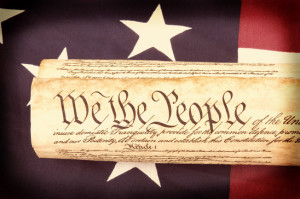Marijuana | Legalization vs. Decriminalization

A discussion of legalization and decriminalization must begin with a brief overview of the power of the Federal Government to control the States. Any action that is prohibited by the Federal Government and the U.S. Constitution must not be allowed in the individual States (e.g., slavery). Conversely, any action that is allowed by the Federal Government must be allowed in the individual States (e.g., recognizing gay marriage). Under the idea of Federalism: If the Federal Government is silent regarding a specific action, then it is up to the individual States to decide whether and how it will be regulated.
Federal law, as written, is still very clear: possession, transfer or sale, and cultivation of cannabis is illegal, thus making it illegal in each of the individual States. Someone in violation of Federal cannabis laws can be prosecuted by the Federal Government. States may also decide how they will prosecute the possession, sale and cultivation of cannabis, and an individual violating a State’s laws can be prosecuted by that State. However, all this changed in 2013 when then-Attorney General Eric Holder announced the State Department would not fight new marijuana legalization laws in Colorado and Washington State, as long as the states ensured children and criminal gangs wouldn’t be able to get their hands on the drugs. The Justice Department also issued a directive that Federal prosecution of low level marijuana offenders would no longer take priority.
Since 2013, several more states have taken steps to decriminalize or legalize marijuana possession, and the list continues to grow as public interest groups educate lawmakers and individuals on the benefits of decriminalization and legalization.
Decriminalization of Marijuana

Decriminalization generally means that under the State’s laws a person will not be criminally punished for possession of a small amount of cannabis intended for personal use, may allow for cultivation for personal use, and/or may allow for nonprofit transfers of small amount (e.g., giving a small amount to a friend). Any penalties imposed for the improper possession or transfer of marijuana are treated like a traffic offense, punished with a small fine, and cannot lead to jail time for first-time offenders. States who have adopted decriminalization policies will still prosecute people who possess, sell, traffic or cultivate large quantities of cannabis, and it is still illegal to give or sell marijuana to minors.
States who have adopted such laws point to national research indicating decriminalization frees up millions of dollars in public funds for the prosecution and rehabilitation of violent criminals and repeat offenders, decriminalization does not lead to increased drug use or overall criminal activity, and decriminalization reduces instances of violence associated with the illegal marijuana trade.
Unfortunately, some jurisdictions who make the jump to decriminalization fail to allow for the legal dispensation of marijuana, leading criminal gangs to still be involved in the supply and sale of weed. Such half-hearted policies fail to realize the potential benefits of a well-rounded policy: bringing marijuana possession and use out of the shadows, dealing a financial blow to criminal organizations, and reducing the stigma for responsible marijuana users.
Legalization of Marijuana
National and international research consistently confirms that the criminalization and prohibition on the responsible use of marijuana has neither swayed public opinion, reduced use, or curbed the billion dollar drug trafficking enterprise worldwide. On the contrary, regulation by criminalization only benefits one group: drug cartels willing to risk everything for the almighty green dollar.
Colorado and Washington State were on the front lines of legalization, voting in 2013 to approve referendums allowing a broad array of recreational marijuana use. Several states have followed suit, allowing for the legal possession of a small personal amount of marijuana, as well as the highly-regulated cultivation and dispensation to individuals by licensed facilities. Legalization means users and possessors will no longer face penalties (criminal or civil), except for violating secondary laws such as designating where marijuana smoking can take place and setting age limits for possession.
Medical Exemption for Marijuana
Even some hard-nosed conservative states like Texas are slowly coming around to the medical benefits of marijuana. In 2015 Texas passed a very narrowly tailored medical marijuana law that will allow certain seizure-sufferers to be treated with non-THC cannabis. Other states that have passed laws allowing doctors to prescribe cannabis for the alleviation of cancer treatment side effects, nerve damage, glaucoma, and the list goes on. Such policies allow legislators to appear compassionate while remaining engaged in the “War on Drugs.”
We take civil liberties seriously. Our legislature has people fighting the good fight, and we need lawyers in the courtroom doing the same. Your rights to be free of unreasonable searches and seizures is not only important, it is vital to our system of government. Marijuana charges create the battlefield for these issues. If you are charged with possession of marijuana get a fighter on your side.
Cofer Law, P.C.300 Throckmorton StreetSuite 500Fort Worth, TX 76102